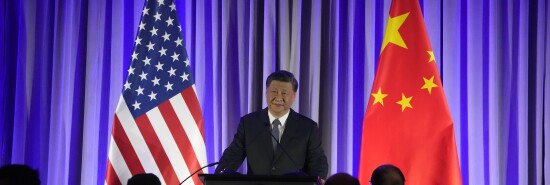
When you abandon trade, wars follow
Dan Hannan
Video Embed
It’s all connected. The hideous, grinding war in Ukraine. The inhumanities in Israel and Gaza. The breezy declaration by Chinese President Xi Jinping that China intends to absorb Taiwan and that President Joe Biden had better not get in his way. The sense of economic insecurity. All are signs of a dissolving Western order, a moment of transition that, as well as being unstable in itself, is almost certain to lead to something worse.
This month, I attended the annual gathering of the Mont Pelerin Society, the association of free-market economists and academics established by F.A. Hayek in 1947. We met in Bretton Woods, where the postwar economic order had been hammered out in 1944, and we were asking ourselves what might succeed it.
INFLATION LET-UP? WHOLESALE PRICES FELL IN OCTOBER BY MOST SINCE WORST OF PANDEMIC
The opening presentation was by Douglas Irwin of Dartmouth College, one of the most brilliant economists of our age. He offered a more convincing theory than any I have seen for the current cascade of conflicts.
Irwin mapped out the rise and fall of international trade over the past 200 years. In essence, he found that commerce increased throughout the Victorian age, driven by the hegemony of the United Kingdom, which unilaterally adopted free trade in the 1840s.
Then, in the early 20th century, things changed. Britain was challenged by Germany, and there were demands for retaliatory tariffs. There followed three terrible decades marked by protectionism and conflict: World War I, the Great Depression, and World War II.
Afterward, there was a sense that the world had to forestall the beggar-my-neighbor tariffs that had prolonged the Depression and propelled autocrats into office. Hence the GATT and other structures designed to facilitate free exchange.
“At this particular time,” President Harry Truman said in 1947, “the whole world is concentrating much of its thought and energy on attaining the objectives of peace and freedom. These objectives are bound up completely with a third objective: reestablishment of world trade. In fact, the three — peace, freedom, and world trade — are inseparable.”
He was right. The spread of globalization after 1945 went hand in hand with greater peace and greater prosperity, a process that accelerated after 1989, when American dominance became unchallenged. As recently as 1981, 40% of the world’s population was in extreme poverty. By the end of the century, that number had fallen to 29%. By 2010, it was 11%.
Then came the financial crisis and deglobalization — and nothing has quite been the same since. The year 2011 saw the publication of two magnificent books: The Better Angels of Our Nature by Steven Pinker, which showed that contrary to almost universal belief, violence of every kind, from homicide to war, was in long-term decline, and The Rational Optimist by Matt Ridley, which applied a similar argument to economic and social development.
Twelve years on, 2011 is starting to look like the peak year. We have since seen a steady retreat of democracy, the rule of law, and economic freedom (though not yet of economic growth, other than during the pandemic).
Why? Because that was when, as Irwin’s scary charts show, countries began to turn away from globalization and pursue self-sufficiency.
To recap, we have known two periods of prolonged peace and prosperity — one under the Pax Britannica in the 19th century and the other under the Pax Americana from 1945 until, well, until now. Suddenly, we are back to what was the norm for most periods of history: multipolarity, great power rivalries, onshoring, mercantilism, and authoritarianism.
We have forgotten that free trade was as much about peace as about growth. It makes scrambling for resources pointless and wars expensive. In the words of the British radical Richard Cobden: “Free trade shall act on the moral world as the principle of gravitation in the universe, drawing men together, thrusting aside the antagonism of race, and creed, and language, and uniting us in the bonds of eternal peace.”
CLICK HERE TO READ MORE FROM THE WASHINGTON EXAMINER
Cobden went on to negotiate the modern world’s first free trade agreement, the Cobden-Chevalier Treaty of 1860, which scrapped all tariffs between Britain and France. Those two countries had been in a state of semipermanent war for the previous 600 years. Since 1860, unless we count the sinking of the Vichy fleet in 1940, they have never clashed.
All that was forgotten in the years of Smoot-Hawley protectionism. And it has been forgotten again today, not least by the leaders of both parties (with the honorable exception of Gov. Ron DeSantis (R-FL), who has just signed a trade liberalization deal between Florida and the U.K.). No, however you look at it, this is not going to end well.
